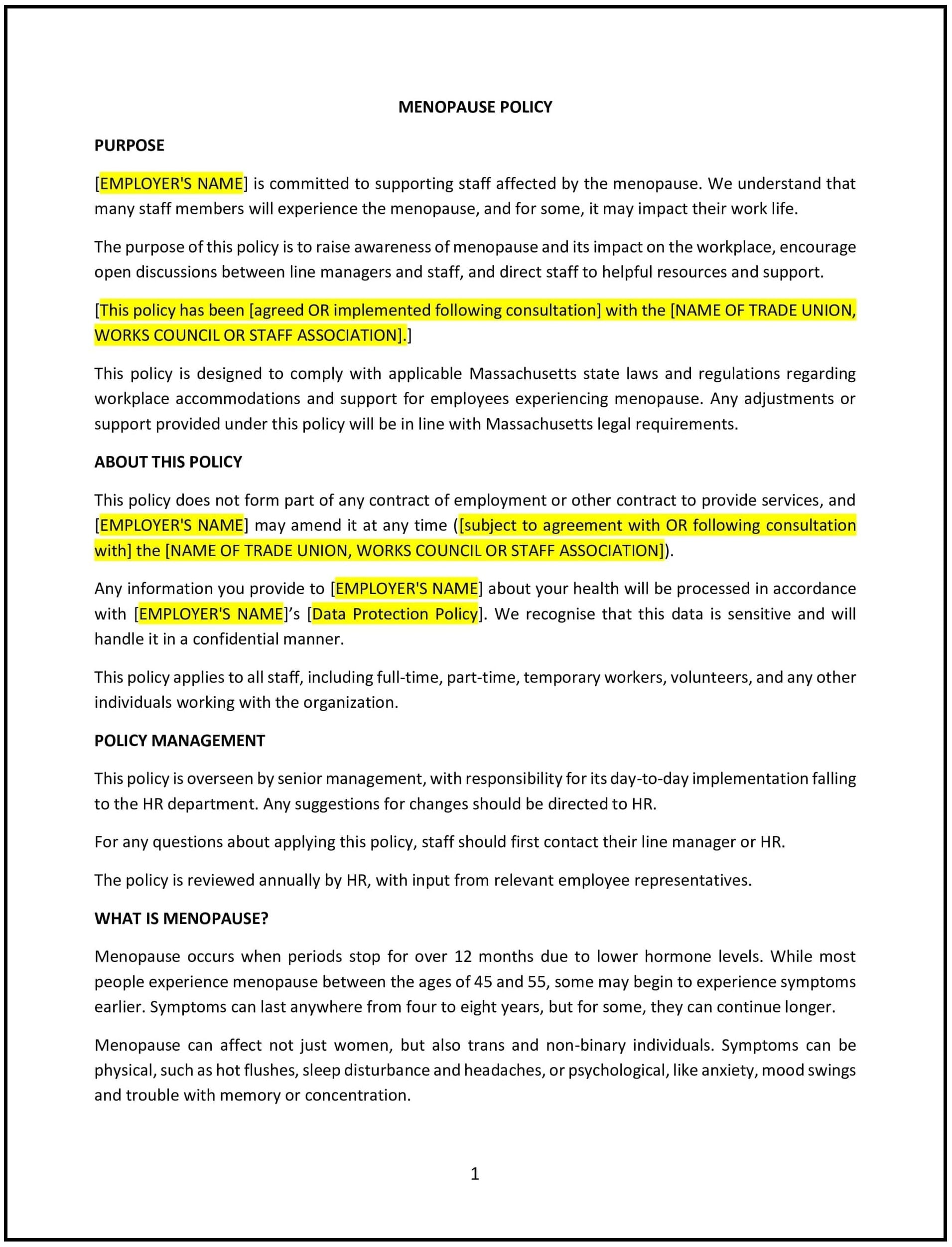Got contracts to review? While you're here for policies, let Cobrief make contract review effortless—start your free review now.

Customize this template for free
This menopause policy is designed to help Massachusetts businesses provide support for employees experiencing menopause symptoms. The policy acknowledges the challenges that employees may face during menopause and outlines the company’s approach to offering a supportive work environment. It covers aspects such as reasonable accommodations, employee well-being, and access to resources, ensuring that employees can continue to work effectively while managing symptoms related to menopause.
By adopting this policy, businesses can foster a more inclusive, supportive, and equitable workplace, while ensuring that they remain compliant with Massachusetts state laws and federal regulations.
How to use this menopause policy (Massachusetts)
- Define menopause and related symptoms: Clearly define menopause and the symptoms employees may experience, such as hot flashes, fatigue, mood changes, and cognitive difficulties. The policy should emphasize the company’s commitment to supporting employees through this life transition.
- Outline reasonable accommodations: Specify the types of accommodations that may be offered to employees experiencing menopause symptoms. These could include flexible working hours, a more comfortable work environment (such as access to fans or temperature-controlled areas), and support for mental health.
- Address confidentiality: Ensure that all information related to an employee’s menopause symptoms or accommodation requests is kept confidential and only shared with relevant personnel on a need-to-know basis. Employees should be assured that their privacy will be respected throughout the process.
- Provide employee support: Offer access to resources, such as counseling services, educational materials, or support groups, to help employees manage menopause symptoms. The policy should also mention any health and wellness programs that may assist employees during this time.
- Encourage open communication: Create an open environment where employees feel comfortable discussing their needs and seeking support without fear of stigma or discrimination. Encourage managers to be sensitive to employees’ concerns and to work collaboratively to identify suitable accommodations.
- Promote a healthy work-life balance: Encourage a flexible approach to work that allows employees to balance their professional and personal needs. This could include allowing remote work, flexible hours, or adjusting workloads to accommodate symptoms.
- Ensure compliance with Massachusetts and federal laws: Ensure that the policy complies with Massachusetts state laws, including the Massachusetts Fair Employment Practices Law, and federal regulations such as the Americans with Disabilities Act (ADA) and the Pregnancy Discrimination Act, which protect employees from discrimination related to medical conditions.
- Review and update regularly: Periodically review and update the policy to ensure that it remains aligned with changes in Massachusetts state laws, federal regulations, and the evolving needs of employees.
Benefits of using this menopause policy (Massachusetts)
This policy offers several benefits for Massachusetts businesses:
- Supports employee well-being: By offering accommodations and resources for employees experiencing menopause, businesses help maintain employee health and well-being, contributing to a more productive and satisfied workforce.
- Reduces absenteeism: Providing support for employees experiencing menopause symptoms can reduce absenteeism by helping them manage their symptoms and remain engaged at work.
- Fosters inclusivity and diversity: Offering menopause support demonstrates the company’s commitment to inclusivity, ensuring that employees at all stages of life feel valued and supported in the workplace.
- Enhances employee retention: By creating a supportive work environment, businesses can improve employee retention, particularly among those who may be experiencing menopause and need workplace adjustments.
- Improves company reputation: Companies that support employees during menopause are seen as progressive and inclusive, which enhances their reputation among current and potential employees, customers, and the public.
- Reduces legal risks: By strengthening compliance with relevant state and federal laws, businesses reduce the risk of legal claims related to discrimination or failure to provide accommodations for menopause symptoms.
Tips for using this menopause policy (Massachusetts)
- Communicate the policy clearly: Ensure that all employees are aware of the menopause policy and understand their rights and options for requesting accommodations. Include the policy in the employee handbook and communicate it through training or informational sessions.
- Offer training for managers: Provide managers with training on how to support employees experiencing menopause, including how to approach sensitive conversations, offer appropriate accommodations, and promote a supportive work environment.
- Create a confidential reporting process: Establish a confidential process for employees to request accommodations or report menopause-related concerns. Ensure that employees feel safe and comfortable seeking support.
- Encourage a stigma-free environment: Foster a work culture where employees feel comfortable discussing menopause symptoms and seeking support without fear of judgment or discrimination. This can include offering resources on menopause and encouraging open, respectful communication.
- Monitor the effectiveness of the policy: Regularly assess how well the policy is working and whether employees feel that their needs are being met. Gather feedback and make adjustments as necessary to improve the policy’s effectiveness.
- Review and update regularly: Periodically review the policy to ensure it is compliant with Massachusetts state laws, federal regulations, and evolving employee needs. Make any necessary updates to address new challenges or changes in legal requirements.